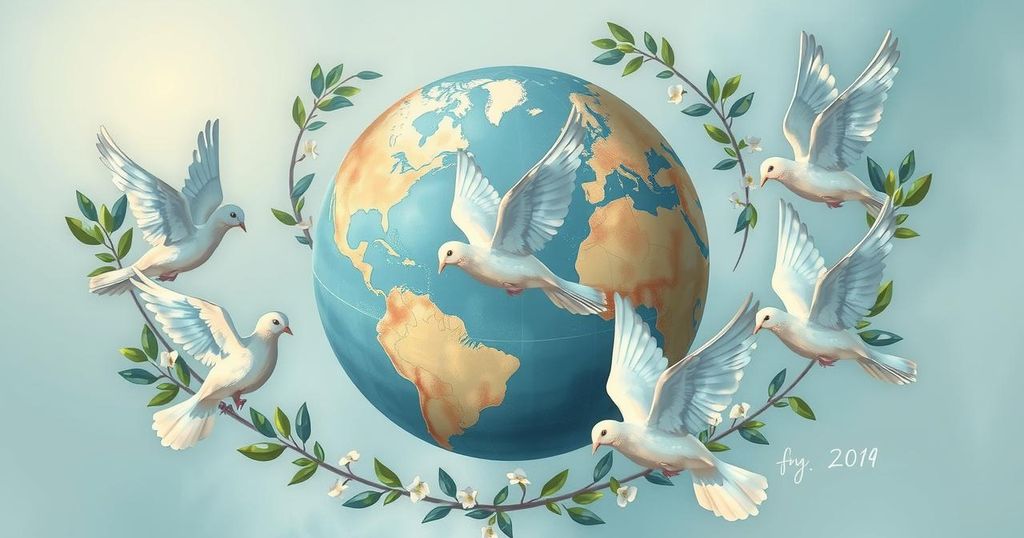Trump and Rubio Secure Rwanda-Congo Peace Treaty Amid Pakistan’s Nobel Prize Nomination
President Trump announces a peace treaty between Rwanda and Congo while being nominated for the 2026 Nobel Peace Prize by Pakistan. Despite claiming significant diplomatic achievements, Trump doubts he will ever receive the Nobel Prize. India refutes his claims about mediating their conflict with Pakistan, emphasizing direct negotiations instead. Additionally, Pakistan praises Trump’s leadership during the 2025 India-Pakistan crisis in their formal nomination.
President Donald Trump announced on Friday that he, along with Secretary of State Marco Rubio, has successfully brokered a peace treaty between Rwanda and the Democratic Republic of Congo. This comes amid a rather dramatic week where the Government of Pakistan formally nominated him for the 2026 Nobel Peace Prize. Trump described the agreement as a “wonderful” resolution to decades of conflict that has wrought significant violence and suffering in the region.
In a post on Truth Social, Trump expressed his excitement regarding the treaty, stating that representatives from both Rwanda and Congo are scheduled to arrive in Washington on Monday for the signing ceremony. The president’s upbeat remarks contrast sharply with his apparent resignation to the fact that he may never receive a Nobel Peace Prize, despite his ongoing diplomatic efforts.
Though he acknowledged the treaty’s significance, Trump declared, “I won’t get a Nobel Peace Prize for this.” He mentioned various other international conflicts he believed he helped mediate — including those involving India, Pakistan, and the Middle East — yet he insisted his efforts would go unrewarded. “No, I won’t get a Nobel Peace Prize no matter what I do… but the people know, and that’s all that matters to me!” he stated.
Indicating a misunderstanding regarding the India-Pakistan conflict, Trump’s claims prompted a swift response from India. Indian Foreign Secretary Vikram Misri issued a statement to clarify that any discussions for a ceasefire had been conducted directly between India and Pakistan without outside mediation. Misri emphasized that India has historically rejected any form of third-party involvement.
The question of the Nobel Peace Prize arose just hours after Pakistan’s government released a detailed post on social media, endorsing Trump for the award. The official post outlined Pakistan’s view of Trump’s diplomatic endeavors, praising his skills in addressing the recent India-Pakistan crisis as a mark of strong leadership during a time of regional unrest.
The government claimed Trump demonstrated “great strategic foresight and stellar statesmanship” while facilitating discussions between New Delhi and Islamabad. Furthermore, they expressed admiration for Trump’s offers to help resolve the Jammu and Kashmir dispute, a contentious issue at the core of South Asian instability. This nomination has significant implications as it aligns with ongoing global tensions, including humanitarian crises in the Middle East.
As for the Nobel Peace Prize nomination process, it requires submissions from qualified nominators like national governments and international organization members. With nominations remaining confidential until they are revealed at a later date, the formal deadline for entries is Jan. 31, which explains the timeline for the 2026 award.
In summary, President Trump’s recent announcement about securing a peace treaty between Rwanda and Congo appears to coincide with his nomination for the 2026 Nobel Peace Prize by Pakistan. While expressing pride in his achievements, he also made waves by dismissing the likelihood of receiving the prestigious award, even amidst his various diplomatic endeavors. As regional and international conflicts continue to unfold, the ramifications of such nominations remain to be seen, particularly in relation to ongoing tensions in South Asia and the Middle East.
Original Source: www.foxnews.com




Post Comment